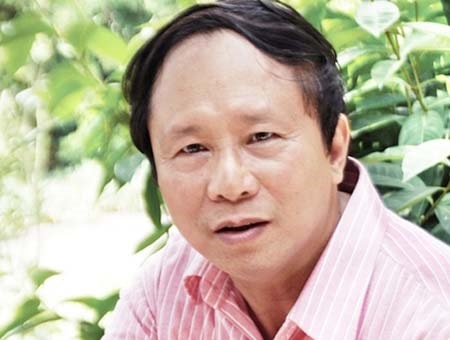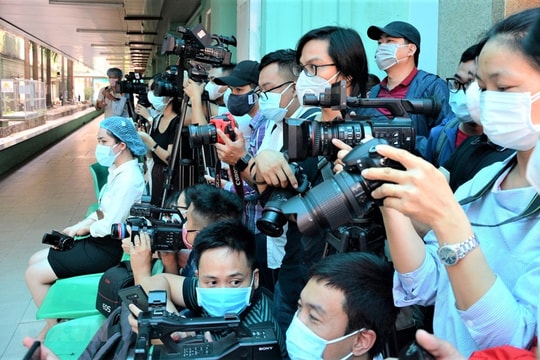Journalism must fight for the truth with legal evidence
That is the content of the answer to the reporter of Mr. Duong Xuan Nam, former Editor-in-Chief of Tien Phong Newspaper about "the role of the press and media in clearing the name of the wronged".
It is not now that the reporting to clarify cases with signs of wrongful convictions has appeared. In fact, the press has contributed to clarifying many wrongful convictions in the past. On the occasion of the wrongful conviction of Mr. Huynh Van Nen, which has just been clarified through a public apology by the prosecuting agencies, the story of applying the press and the role of the press in cases that have been cleared of wrongful convictions has emerged. What should the press do in cases with signs of wrongful convictions?
To answer this question, PV had an interview with Mr. Duong Xuan Nam, former Editor-in-Chief of Tien Phong newspaper. Mr. Duong Xuan Nam is the person who directed PV to investigate and verify many wrongful convictions, including the case of exonerating a university lecturer who was wrongly convicted of murder.
 |
| Mr. Duong Xuan Nam, former Editor-in-Chief of Tien Phong Newspaper. |
Sir, currently, the story of the wrongful conviction of Mr. Huynh Van Nen is attracting much public attention, many issues are being raised, especially the role of the media in clearing the names of those who have been wrongly convicted. It is known that when you were the Editor-in-Chief of Tien Phong newspaper, you directed articles to clear the names of those who have been wrongly convicted. Would you please tell this story again?
Nearly 30 years ago, Tien Phong newspaper re-opened a wrongful conviction case, the case of Nguyen Sy Ly in Nghe An. Ly was a lecturer at Tay Nguyen University. When he returned home for Tet, a murder occurred in the village... Ly was convicted of murder by the court. In prison, Ly and his family wrote petitions for many years, but to no avail. A fellow prisoner, Cao Tien Mui, saw that Ly was wronged, tried to reform himself to be released early, and would find a way to clear Ly's name. After being released from prison, Mui met a watch repairman in the district town, Ho Hong Tuyen, to tell him about the incident. Tuyen went to Tien Phong newspaper to ask him to publish it. Tien Phong newspaper (at that time I had just become editor-in-chief) sent reporter Manh Viet to investigate with Ho Hong Tuyen, writing many installments published in Tien Phong. The investigative report "Three thousand days of injustice" shocked public opinion at that time. The authorities got involved and Nguyen Sy Ly was cleared of his wrongful conviction, returning to work as a lecturer at a university in Tay Nguyen. Ho Hong Tuyen later became a valuable contributor to Tien Phong newspaper. Perhaps that was the first wrongful conviction case that was cleared by the press...
At that time, to clear the name of others, what pressure did you and the newspaper have to endure?
A lot of pressure. First of all, the superiors always reminded me to report and explain regularly. At that time, it was not as open as it is now, so it was very tiring. I went to meet the Chief Justice of the Supreme People's Court many times to make recommendations and explain... Luckily, at that time, Mr. Pham Hung, Chief Justice of the Supreme People's Court, knew how to listen and he actively directed his subordinates to resolutely clarify everything... Mr. Pham Hung's opinion was published in Tien Phong newspaper at that time and had a great effect...
From this story and the story of Mr. Huynh Van Nen, Mr. Nguyen Thanh Chan shows that the exoneration has a significant contribution from the press and media. How do you evaluate it?
I think one of the tasks of the press is to express one's opinion on matters that concern many people. The press must contribute to the fight for social democratization, for justice, for reason, and for the legitimate rights of the people... Tien Phong Newspaper has been actively fighting for these things for many years, especially defending and protecting the legitimate rights of young people. After the Nguyen Sy Ly case, we had many successful fights such as protecting a young man sentenced to death from the death penalty. When he was released from prison, the newspaper contacted him to ask for a job. Every Tet, he brought flowers to thank Tien Phong Newspaper.
Can you share your experience and "inspire" your colleagues in detecting and resolutely pursuing cases with "signs of wrongful convictions"?
My experience is: Truth. Must be for the truth, fight for a pure purpose, not for personal gain, and must have LEGAL evidence. I emphasize this because there are truths that are presented without LEGAL evidence, which is very difficult. LEGAL evidence means there must be recordings, photos, or specific documents and data...
Sir, what advice do you have for families who discover that their relatives have "signs of wrongful conviction" so that they can get to the bottom of the matter like Mr. Chan, Mr. Nen, Mr. Luong Ngoc Phi... and the character you mentioned?
First of all, you have to write a petition to the authorities, and you have to be persistent in order to penetrate the multi-layered "fortress"...
Next, we must seek out press agencies, genuine journalists who dare to fight for truth and justice...
And if there is evidence provided to the press, that would be great...
Thank you!
According to Infonet
| RELATED NEWS |
|---|


